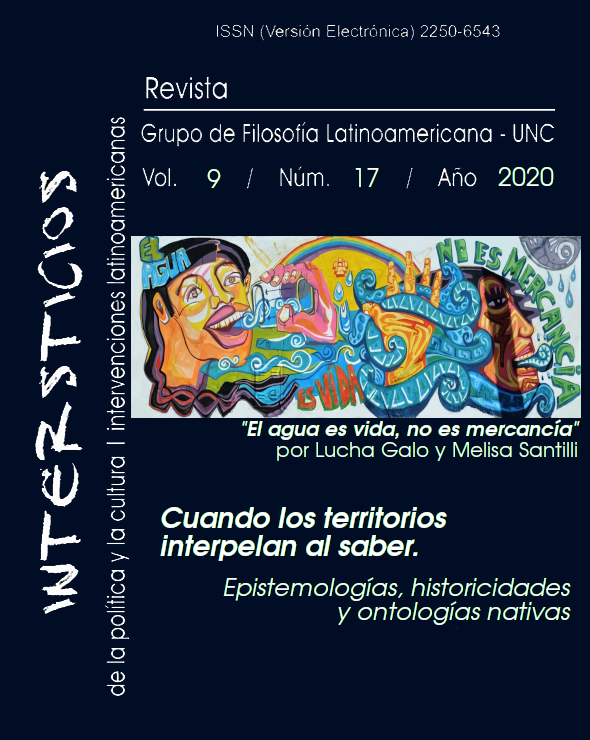The academic word in question. Notes for a meta-critical reflection
Keywords:
Literary studies, Race, Alterity, Academic discourse, WhitenessAbstract
The following article proposes some considerations on the role of the researcher in the field of literary studies. More precisely, we are interested in recovering and getting in an extensive debate that problematizes the status of the academic discourse, especially, in literary investigations that address problems and build their corpora from the recognition of certain traits of subalternity. In this way, we start from a self-reflexive movement within our own investigations, crossed by questions about ethnic and race issues (in them, the mapuche and the blackness emerge as constitutive marks of the studied phenomena). In this movement, we propose possible lines of answers to some dilemmas faced by that academician who continues to ask herself how to approach alterity properly. The article is divided into two instances of reflection: in the first, we recover and articulate contributions from various authors that help us think about the risks involved in the uncritical use of the academical word. In the second, we propose some considerations around the methodological options that are presented as alternatives when addressing corpus of analyzes crossed by certain brands of subalternity. To this end, we will evaluate the scope and operability of certain categories -race, otherness, whiteness- that are relevant in the analytical development of our corpus. As we will see, the challenge lies in the evaluation of our own standpoint of enunciation, from the verification of the structural racial inequality that crosses academic practices and from the commitment of epistemic surveillance that we decided to assume.
Downloads
References
Ancalao, L. (2009). Mujeres a la intemperie. Pu zomo wekuntu mew. Buenos Aires: El suri porfiado Editores.
Ancán Jara, J. (2009) “El poema a la vena entra lloviendo por el paisaje”. En Aniñir Guilitraro, D. (2009) Mapurbe, venganza a raíz. Santiago: Pehuén Ed.
Aniñir Guilitraro, D. (2009) Mapurbe, venganza a raíz. Santiago: Pehuén Ed.
Clifford, J. (1998). “Sobre la autoridad etnográfica”. Dilemas de la cultura. Antropología. Literatura y arte en la perspectiva posmoderna. Barcelona: Gedisa
Constitución Nacional Argentina (1994). Artículo 75, inciso 17. Versión digital. Recuperado de: https://www.casarosada.gob.ar/images/stories/constitucion-nacional-argentina.pdf
Cucurto, W. (2012). Cosa de negros. Buenos Aires: Interzona.
De la Campa, R. (2017). Rumbos sin telos. Residuos de la nación después del Estado. Santiago de Querétaro: Rialta.
Fanon, F. (1973): Piel negras, máscaras blancas. Buenos Aires: Ed. Abraxas.
Frankenberg, R. (2004). “A miragem de uma branquidade não-marcada”. En Ware, V. (org) (2004). Branquidade: identidade branca e multiculturalismo (307-338). Rio de Janeiro: Garamond Universitária.
Giraldo, S. (2003). “Nota introductoria”. En Revista Colombiana de Antropología. Vol. 39. Enero-Diciembre (2003). 297-301. Recuperado de https://www.icanh.gov.co/nuestra_entidad/grupos_investigacion/antropologia_social/publicaciones_seriadas_antropologia/5878
Grosso, J. L. (2008). “Introducción” y “Capítulo 1”. En Grosso, J. L. (2008). Indios muertos, negros invisibles: Hegemonía, identidad y añoranza (15-75). Córdoba: Encuentro Grupo Editor.
Huenún, J. L. (2016). La calle Mandelstam y otros territorios apócrifos. Santiago: Fondo de Cultura Económica.
Iño Daza, W. G. (2017). “Epistemología pluralista, investigación y descolonización. Aproximaciones al paradigma indígena”. En RevIISE, Vol. 9, Núm. 9. Abril-Septiembre (2017). 111-125. Recuperado de http://www.ojs.unsj.edu.ar/index.php/reviise/issue/view/15
Mellado, S. (2013). La morada incómoda. Estudios sobre poesía mapuche. Gral. Roca: Publifades.
Margulis, M. (1999). La segregación negada: cultura y discriminación social. Buenos Aires: Biblios.
Mignolo, W. (2003). “Prefacio a la edición castellana ‘Un paradigma otro’: colonialidad global, pensamiento fronterizo y cosmopolitismo crítico”. En Mignolo, W. (2003). Historias locales/diseños globales. Colonialidad, conocimientos subalternos y pensamiento fronterizo (19-60). Madrid: Akal.
Pinda, A. (2014). Parias zugun. Santiago: LOM.
Pizarro, A. (2017). “Saber hegemónico y alteridad”. Hispamérica. Año XLVI, Núm. 136 (2017). 33-41.
Rama, Á. (1984). La ciudad letrada. Hanover: Ed. Del Norte.
Rivera Cusicanqui, S. (2010). Ch’ixinakax utxiwa: una reflexión sobre prácticas y discursos descolonizadores. Buenos Aires: Tinta Limón.
Rosaldo, R. (2000). “La subjetividad en el análisis social” y “Cruce de fronteras”. Cultura y Verdad. La reconstrucción del análisis social. (195-222; 223-244) Quito: Ed. Abya-Yala.
Segato, R. (2007). La Nación y sus Otros. Raza, etnicidad y diversidad religiosa en tiempos de Políticas de Identidad. Buenos Aires: Prometeo Libros.
Spivak, G. C. (2003). “¿Puede hablar el subalterno?”. Revista Colombiana de Antropología, Vol. 39, Enero-Diciembre (2003). 301-364. Recuperado de https://www.icanh.gov.co/nuestra_entidad/grupos_investigacion/antropologia_social/publicaciones_seriadas_antropologia/5878
Trigo, A. (1997). “Fronteras de la epistemología: epistemologías de las fronteras”. Papeles de Montevideo. Literatura y cultura, Jun. (1997). 71-89.
Wallerstein, I., Balibar, E. (1988). Raza, nación y clase. Madrid: Iepala.
Ware, V. (2004). “O poder duradouro da branquidade: ‘um problema a solucionar’”. En Ware, V. (org) (2004) Branquidade: identidade branca e multiculturalismo. (7-40) Rio de Janeiro: Garamond Universitária.
Downloads
Published
Issue
Section
License
Copyright (c) 2020 Intersticios de la política y la cultura. Intervenciones latinoamericanas

This work is licensed under a Creative Commons Attribution-NonCommercial-ShareAlike 4.0 International License.
Authors who have publications with this journal agree to the following terms:
a. Authors will retain their copyright and grant the journal the right of first publication of their work, which will simultaneously be subject to the Creative Commons Attribution License that allows third parties to share the work as long as its author and first publication in this journal are indicated.
b. Authors may adopt other non-exclusive license agreements for distribution of the published version of the work (e.g., deposit it in an institutional telematic archive or publish it in a monographic volume) as long as the initial publication in this journal is indicated.
c. Authors are allowed and encouraged to disseminate their work through the Internet (e.g., in institutional telematic archives or on their web page) after the publication process, which may produce interesting exchanges and increase citations of the published work (see The effect of open access).


